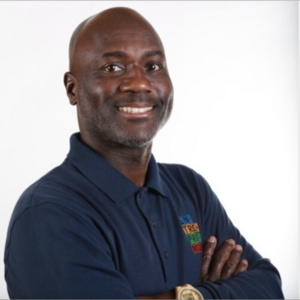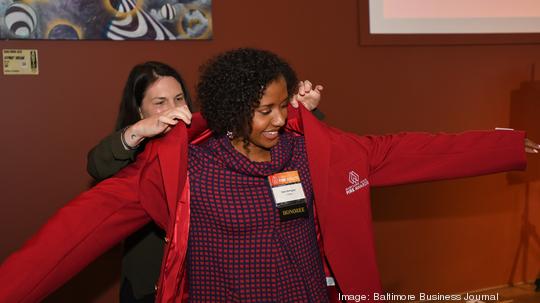
It was no easy feat choosing 15 outstanding local innovators to honor with the 2022 Fire Awards, a new program presented by Maryland Inno and the Baltimore Business Journal.
But it was even harder narrowing that list down to select a top "Blazer" company in each category. To help us pick, we recruited three local executives with extensive knowledge of the local tech and innovation scene to serve as judges.
The Blazers were unveiled publicly Tuesday night at the Fire Awards celebration held at Busboys & Poets in Columbia. Along with their Fire Awards, the Blazers were also gifted a bright red blazer jacket to wear or display in their office and commemorate their achievements.
Learn more about the Fire Awards and how honorees were selected, here.
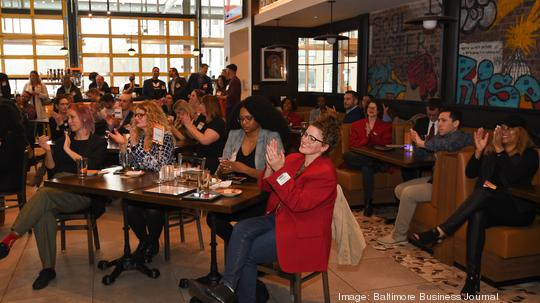
The 2022 Blazers are;
- 1501 Health, in the Igniters category
- EcoMap Technologies, in the Still Burning category
- Longeviti Neuro Solutions, in the Medical category
- Parity Homes, in the Sustainability & Equity category
- SmartLogic, in the Software category
Below, you'll find short descriptions of each, as well as Q&As with the leader(s) of the company or organization.
Igniters: 1501 Health
An incubator for early-stage health care startups created by a partnership between LifeBridge Health system and Healthworx, the innovation and investment arm of health insurer CareFirst BlueCross BlueShield. The Canton incubator's year-long program provides each cohort member with up to $100,000 in investment capital along with mentorship and support from experts within LifeBridge and CareFirst. 1501 Health launched its first cohort in April 2021, and is preparing to begin its second cohort of seven companies.
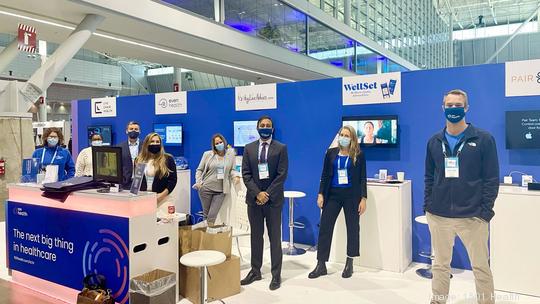
Responses from: Pothik Chatterjee, assistant vice president of innovation and operations support, LifeBridge Health; and Emily Durfee, 1501 Health co-manager and director of Healthworx strategy and portfolio acceleration
How are your company’s innovations changing your industry’s landscape?
Chatterjee: 1501 Health is the first payer-provider incubator program in our region and one of the few at a national level that combines the clinical expertise and payer insights of a health system and insurance network to support early-stage health tech startups. Payer-provider collaboration is key to shifting our industry further toward value-based care and achieving our common triple aims: reduced costs, improved outcomes and improved experience for our patients.
The innovations from our startups in 1501 Health are themselves supporting key shifts in our health care industry, as we move into hybrid virtual and in-person care delivery models.
What advice do you have for future and current startup founders and CEOs?
Durfee: I recommend that founders and CEOs get in front of prospective customers early in the process to understand their needs so they can build a tailored solution that works for them. They should also understand how their solution ranks versus other customer priorities. Out of all the problems startups are trying to solve, your solution must be in your customer’s top five priorities to get funded. Otherwise, you’ll get a lot of conversations but no partnership or contract.
I also suggest finding your tribe as an entrepreneur. The field can be overwhelming and isolating. You need a group of advisors and peers who are in the trenches with you for support and collaboration.
How has being based in Greater Baltimore helped your company to grow?
Chatterjee: 1501 Health’s DNA is closely tied to Baltimore, starting with our name that comes from the physical location of our incubator space at 1501 South Clinton Street in Baltimore.
We are fortunate to have a robust and thriving ecosystem for innovation and digital health in Baltimore, supported by strong health care institutions, universities and proximity to the National Institutes of Health and U.S. Food and Drug Administration.
Two examples where our Baltimore location has been helpful are [1501 Health graduate companies] Live Chair Health and Even Health. Both are Maryland-based companies, and the local presence has helped us implement pilot programs at LifeBridge Health to test and validate their platforms with our communities and employees.
What’s next for your company?
Durfee: We are so excited to announce that we just brought on our second cohort of amazing 1501 Health companies. These startups are going to have such an impact on the world and the people we serve every day. We’re going to keep running this program and adding more entrepreneurship support to our existing offerings. Hopefully, this will consist of hybrid and in-person events in 2022 and leveraging the resources across the Baltimore ecosystem.
We would also love to start sharing the knowledge and learnings collected around supporting startups with other organizations interested in pursuing strategic partnerships.
Still Burning: EcoMap Technologies Inc.
A Baltimore-based startup that collects data on various types of ecosystems and builds platforms to help people navigate them. The company was born out of a Johns Hopkins University research project focused on helping entrepreneurs better understand and navigate the startup ecosystem in their city. It has since expanded to over 20 ecosystems across the U.S. and abroad. EcoMap has grown from a team of five at the start of 2021 to more than 15 employees today. The company is also among 12 early-stage companies accepted into UpSurge Baltimore's highly competitive, 13-week Techstars Equitech Accelerator. At the helm, is 24-year-old Pava LaPere, who in 2021 was named to Maryland Inno's Under 25 list.
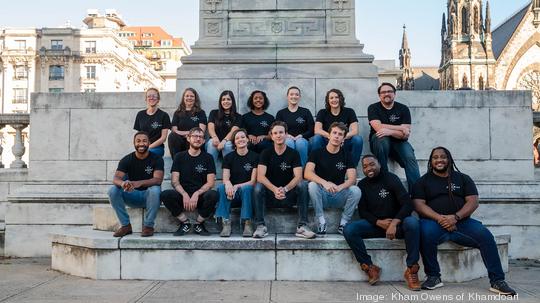
Responses from: Pava LaPere, founder & CEO
How are your company’s innovations changing your industry’s landscape?
Until EcoMap, it was painfully hard to answer simple questions about what's happening in any ecosystem. "Who is doing what?" or "what currently exists?" are basic questions that are hard to answer whether you're talking about your city's tech community, the industry you work in, or in a corporate network. With EcoMap, we're able to centralize information about the organizations, resources and other activities within these ecosystems so that it becomes easy to understand what is going on. Imagine being able to immediately find all the Black-owned small businesses in Baltimore, all funding sources for growth startups in the mid-Atlantic, or all nonprofits focused on workforce development in Maryland. That's what EcoMap does for ecosystems across the world — we're making hyperlocal information more accessible at scale.
How has being based in Greater Baltimore helped your company to grow?
When we first started in 2018, the Baltimore tech ecosystem was heating up, but it was still siloed and funding-sparse. In the past year, organizations like Upsurge have been a catalyst for the tech community — there are more programs than ever to support early-stage companies. There are so many advantages to being in a growing ecosystem instead of a saturated one like New York, Austin, or Miami — everyone is willing to go to bat to help you, you can get connected to practically anyone in the city, and your money goes so much further. We wouldn't ever consider leaving Baltimore now that the ecosystem has matured so much.
What was your biggest roadblock to growth and how did you overcome it?
We grew rapidly over the pandemic before we had raised any external capital. This put us in a tough spot because we had such high customer demand and needed to make long-term investments in our team and tech to keep up. But without external funding, it was really tough to grow as quickly as we needed to, not to mention how stressful it was trying to manage cash flow. We were lucky to have solid customer revenues and an early debt investor that helped us get on solid ground as we prepared the company to raise equity capital. I owe that investor, and the fellow Baltimore CEO that made the intro, so much. Without that bridge, we may not have been able to survive the demand crunch and get to the solid growth path we are on today.
What advice do you have for future and current startup founders and CEOs?
Do your market research before investing heavily in product development. Before launching, we spent nearly two years understanding the market, talking to customers and really understanding the pain points that existed and how to build tech to solve them. We created our product around these problems, so when we went to market, the product practically sold itself. This is the side of the demand curve that you want to be on, and you can tip that in your favor by spending time upfront understanding your market. For software companies, definitely use low-code tools like Bubble.io for your first few product versions — it will save you hundreds of thousands of dollars and months of development time.
Software: SmartLogic
A Baltimore software firm specializing in building web and mobile applications for client firms. Among the company's recent projects is the open-source Challenge.Gov platform for the U.S. General Services Administration; a scalable platform to support World Central Kitchen, which serves meals to people experiencing food insecurity; and a project to support a major distributor of at-home Covid tests. Last year, the company relaunched its paid apprenticeship program aimed at bringing diverse, aspiring developers into the tech industry, one of several efforts to create accessible onramps to careers in tech. The company's chief of staff was also named a BBJ Leader in Diversity in 2021.
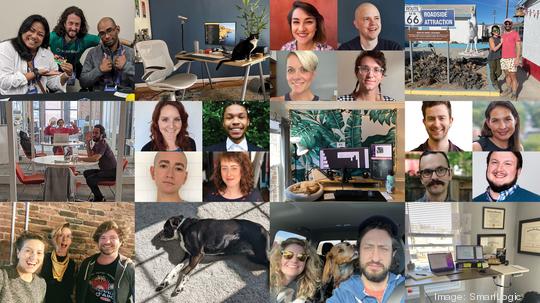
Responses from: Yair Flicker, president
What advice do you have for future and current startup founders and CEOs?
Whatever business you’re going into, remember that success in any endeavor is all about people, process and communication. Test your assumptions; ask questions even when you think the answers may be obvious. Show up and contribute to the community you want to work with, not because it’ll get you business, but because it’s how you’ll develop the relationships you need to be successful.
How has being based in Greater Baltimore helped your company to grow?
SmartLogic has been a Baltimore company from the start; founded in 2005 by two Johns Hopkins University soon-to-be graduates. Early on we joined the Emerging Technology Centers community, where we made a number of both personal and professional connections. Though we are now a distributed team, our offices are at Spark and we still call Baltimore home. The Baltimore and DMV tech community has been crucial to our growth and success from the beginning; as a services business, it’s our job to build tools that help other companies meet their business goals. From successfully exited startups like OrderUp and Red Owl Analytics, to established organizations like the Baltimore City Health Department and the D.C.-headquartered World Central Kitchen, the innovation and drive that businesses have in the Baltimore-D.C. corridor are a huge part of why we’re still in business 17 years after our founding.
Sustainability & Equity: Parity Homes
A Baltimore organization that targets vacant properties en masse and rehabilitates them to create affordable homeownership opportunities with the goal of helping Black families generate wealth. This year, JPMorgan Chase & Co. made a three-year, $2 million commitment to Parity, which founder Bree Jones said will allow her to hire four additional employees to help handle growing demand for homes. The company has a goal to create 200 new Black and Latina homeowners in West Baltimore by increasing the pipeline of Baltimoreans who are trained to work in construction.
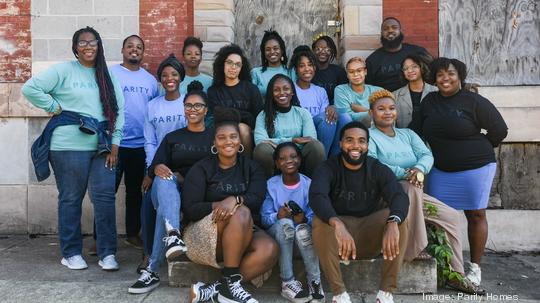
"It's humbling to be creating a new model for equitable development that many are regarding as innovative and game-changing. More than that, it's personally fulfilling working alongside community members at the grassroots level to bring to fruition their vision for their community's revitalization," Parity Homes founder Bree Jones told the BBJ in April 2021.
Jones could not be reached for comment for this publication.
Medical: Longeviti Neuro Solutions
A Hunt Valley-based medical device startup that makes implants for neurosurgery that allow for post-operative ultrasound imaging of the brain. The company is in the process of moving its headquarters to Port Covington's City Garage development amid a recent $5 million round of fundraising. Longeviti reported 60% sales growth year-over-year and added seven employees in 2021.
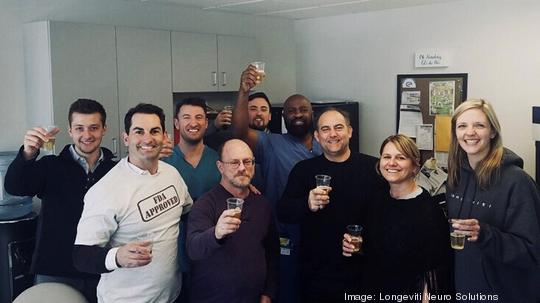
Baltimore is a "medical mega center, especially for neuro," Longeviti Neuro Solutions CEO Jesse Christopher told the BBJ in February, noting the city's rich talent pool and its long history with neurosurgery.
Christopher could not be reached for comment for this publication.

